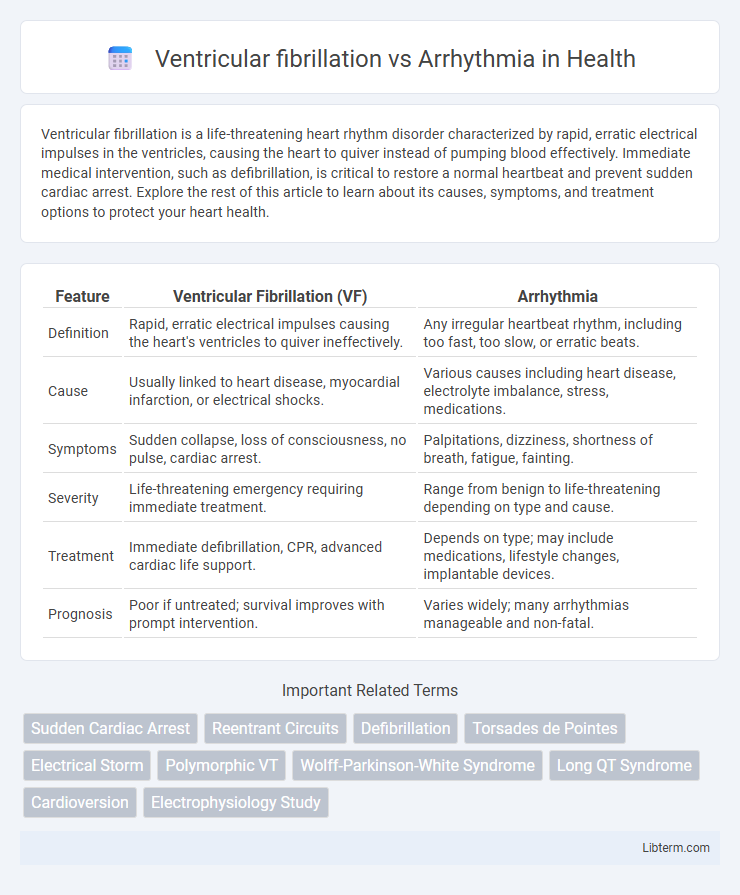Ventricular fibrillation is a life-threatening heart rhythm disorder characterized by rapid, erratic electrical impulses in the ventricles, causing the heart to quiver instead of pumping blood effectively. Immediate medical intervention, such as defibrillation, is critical to restore a normal heartbeat and prevent sudden cardiac arrest. Explore the rest of this article to learn about its causes, symptoms, and treatment options to protect your heart health.
Table of Comparison
| Feature | Ventricular Fibrillation (VF) | Arrhythmia |
|---|---|---|
| Definition | Rapid, erratic electrical impulses causing the heart's ventricles to quiver ineffectively. | Any irregular heartbeat rhythm, including too fast, too slow, or erratic beats. |
| Cause | Usually linked to heart disease, myocardial infarction, or electrical shocks. | Various causes including heart disease, electrolyte imbalance, stress, medications. |
| Symptoms | Sudden collapse, loss of consciousness, no pulse, cardiac arrest. | Palpitations, dizziness, shortness of breath, fatigue, fainting. |
| Severity | Life-threatening emergency requiring immediate treatment. | Range from benign to life-threatening depending on type and cause. |
| Treatment | Immediate defibrillation, CPR, advanced cardiac life support. | Depends on type; may include medications, lifestyle changes, implantable devices. |
| Prognosis | Poor if untreated; survival improves with prompt intervention. | Varies widely; many arrhythmias manageable and non-fatal. |
Understanding Ventricular Fibrillation
Ventricular fibrillation is a severe type of arrhythmia characterized by rapid, erratic electrical impulses originating in the ventricles, leading to ineffective heart contractions and sudden cardiac arrest. Unlike general arrhythmias, which can include a wide range of irregular heartbeats, ventricular fibrillation specifically disrupts the heart's ability to pump blood, requiring immediate medical intervention such as defibrillation. Early recognition and treatment of ventricular fibrillation are critical for survival, emphasizing its distinction within the broader category of arrhythmias.
What Is Arrhythmia?
Arrhythmia refers to any irregularity in the heart's rhythm, including abnormal beating rates that are too fast, too slow, or erratic. Ventricular fibrillation is a specific type of arrhythmia characterized by disorganized electrical activity in the ventricles, causing ineffective heartbeats and sudden cardiac arrest. Understanding arrhythmia involves recognizing its various forms, such as atrial fibrillation, bradycardia, and tachycardia, which differ in their impact and treatment approaches.
Key Differences Between Ventricular Fibrillation and Arrhythmia
Ventricular fibrillation is a life-threatening arrhythmia characterized by rapid, irregular electrical impulses in the ventricles causing ineffective heart contractions and severe cardiac arrest risk. Arrhythmia refers to any abnormal heart rhythm, including bradycardia, tachycardia, and fibrillation, affecting heart rate and rhythm in various ways. Key differences include the severity, with ventricular fibrillation requiring immediate emergency intervention, while other arrhythmias may be benign or manageable with medication or lifestyle changes.
Common Causes of Ventricular Fibrillation
Ventricular fibrillation is a severe cardiac arrhythmia characterized by rapid, erratic electrical impulses causing the ventricles to quiver ineffectively, leading to sudden cardiac arrest. Common causes of ventricular fibrillation include coronary artery disease, myocardial infarction, cardiomyopathy, electrolyte imbalances such as hypokalemia or hyperkalemia, and acute ischemia. Unlike other arrhythmias, ventricular fibrillation requires immediate defibrillation, as it disrupts the heart's ability to pump blood effectively.
Causes and Risk Factors of Arrhythmia
Arrhythmia encompasses various irregular heartbeats caused by factors such as coronary artery disease, electrolyte imbalances, and abnormal heart tissue. Risk factors include high blood pressure, excessive alcohol consumption, thyroid disorders, and a history of heart attack or heart surgery. Ventricular fibrillation, a severe form of arrhythmia, specifically results from erratic electrical impulses in the ventricles, often triggered by heart disease or acute myocardial infarction.
Symptoms Comparison: VFib vs. Arrhythmia
Ventricular fibrillation (VFib) presents with sudden collapse, loss of consciousness, and absence of pulse, indicating a medical emergency requiring immediate CPR and defibrillation. Arrhythmia symptoms vary widely, including palpitations, dizziness, shortness of breath, and chest discomfort, depending on the type and severity of the abnormal heart rhythm. VFib symptoms are more severe and life-threatening compared to the generally milder, chronic manifestations seen in other arrhythmias.
Diagnostic Approaches for Both Conditions
Ventricular fibrillation diagnosis primarily relies on electrocardiogram (ECG) monitoring, revealing chaotic and irregular electrical activity in the ventricles, often requiring immediate defibrillation to restore normal rhythm. Arrhythmia diagnosis involves a range of techniques including Holter monitoring, event recorders, and electrophysiological studies to identify abnormal heart rhythms that may not be as immediately life-threatening as ventricular fibrillation. Both conditions benefit from echocardiography and blood tests to evaluate underlying causes and guide treatment strategies, emphasizing early detection and continuous cardiac monitoring.
Treatment Options: Ventricular Fibrillation
Ventricular fibrillation requires immediate treatment with defibrillation to restore normal heart rhythm and prevent sudden cardiac death. Advanced Cardiovascular Life Support (ACLS) protocols recommend prompt chest compressions and administration of epinephrine during resuscitation efforts. Implantable cardioverter-defibrillators (ICDs) may be used for long-term management to prevent recurrent ventricular fibrillation episodes.
Management Strategies for Arrhythmia
Management strategies for arrhythmia often include pharmacological treatments such as beta-blockers, calcium channel blockers, and antiarrhythmic drugs designed to stabilize heart rhythm. In more severe cases, procedures like catheter ablation, electrical cardioversion, or the implantation of pacemakers and implantable cardioverter-defibrillators (ICDs) are employed to restore or maintain normal heart function. Regular monitoring with ECG and lifestyle modifications also play a crucial role in preventing arrhythmia progression and reducing the risk of complications such as ventricular fibrillation.
Prognosis and Prevention Tips
Ventricular fibrillation (VF) presents a critical and often fatal cardiac arrest scenario with a poor prognosis without immediate defibrillation, while general arrhythmias vary widely in severity and outcomes depending on type and underlying conditions. Prevention of VF focuses on managing risk factors such as coronary artery disease, electrolyte imbalances, and previous myocardial infarction through lifestyle changes, medications, and implantable cardioverter-defibrillators (ICDs). For arrhythmias, regular cardiovascular evaluations, maintaining heart-healthy habits, and controlling hypertension and diabetes significantly reduce incidence and improve prognosis.
Ventricular fibrillation Infographic

 libterm.com
libterm.com